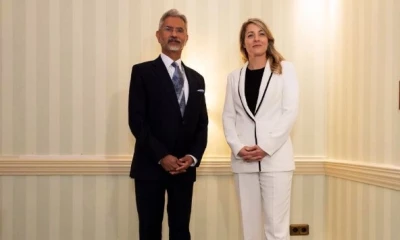External Affairs Minister S Jaishankar engaged in a face-to-face meeting with his Canadian counterpart Mélanie Joly in Munich, with Joly describing the encounter as “a frank discussion”, on Friday.
https://x.com/DrSJaishankar/status/1758602722528379278?s=20
This marked their first formal bilateral meeting since tensions escalated between the two countries following Canadian Prime Minister Justin Trudeau’s remarks in the House of Commons on September 18 regarding “credible allegations” of potential links between Indian agents and the killing of pro-Khalistan figure Hardeep Singh Nijjar in Surrey, British Columbia, on June 18.
Commented on the meeting via a post on X, Jaishankar stated, “Our conversation understandably focused on the present state of our bilateral ties” adding the meeting “was useful to exchange views on the global situation”.
Both ministers were attending the Munich Security Conference in Germany and met on the sidelines of the global event.
Sharing insights from the bilateral meeting, Joly mentioned they held discussions on Canada-India relations and current global issues, including Russia’s invasion of Ukraine.
Despite the strained relations, both ministers had remained in contact throughout the crisis, with Joly revealing their ongoing communication at the end of October last year. The meeting in Munich was sought by Canada as part of its efforts to secure cooperation from Bharat in the Nijjar investigation.
Following Trudeau’s statement, both countries expelled a senior diplomat each, and Bharat suspended visas for Canadian nationals, though these were reinstated in November. Canada removed 41 diplomats from Bharat in response to New Delhi’s demand for “parity” in numbers, a move characterised by Joly as a “mass expulsion.”
While Bharat has initiated a high-level inquiry into the alleged attempt to murder Sikhs for Justice-SFJ general counsel Gurpatwant Pannun, as indicated by an unsealed indictment in a New York court, Nijjar’s murder is not part of that probe. Bharat has sought “specific and relevant” information from Ottawa before cooperating with the ongoing Canadian investigation into Nijjar’s killing, who was the principal figure and coordinator for the so-called Khalistan Referendum in British Columbia.

















